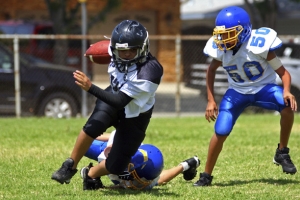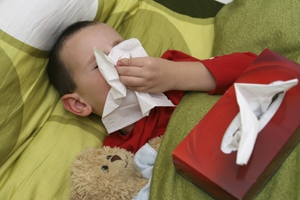
Mention summer camp and kids get excited about activities, art, s’mores and friends. But for parents of kids with food allergies, the prospect of sending a child to day camp or overnight camp can be overwhelming. Rather than letting uncertainty take control, take comfort knowing that camps are becoming more inclusive so that kids with food allergies experience the classic fun of summer camp with their peers.
Many camps are aware of increasing allergies and provide in-depth safety training for staff. “We take allergies very seriously,” says Karla Nafarrate, communications manager at Fleet Science Center. “In our online form, we ask that parents elaborate about their camper’s allergy. This information is shared with the camp administrative team and the educator that will be teaching.”
Some camps, like the ones at The Natural History Museum (theNAT), provide nut-free programming to ensure the safety of all children. If you’re considering camp for a child with a food allergy, use these tips and resources to make camp a smooth process.
Getting Started: Choose the Right Camp
1. Assess your comfort level with different types of camps: Is day camp more appropriate or is your child ready for sleepaway camp?
2. Do your research. What camps interest your child? Use our camp listing and Virtual Camp Fair to narrow choices.
3. Speak with camp directors. Phone calls create a connection to gauge a camp’s willingness and ability to handle your child’s needs. Ask lots of questions to ensure camps meet your safety criteria and comfort level.
4. Narrow list to camps that can accommodate your child’s needs.
5. Look for a camp that is well prepared and has a fully trained staff. Trust your gut. “We work really hard to be inclusive, to not label a child, and use our awareness and training to just let them have a great week,” says Christine Griffith, family programs manager at theNAT.
Questions to ask
- Do campers bring their own lunch and snacks?
- Is there a safe place to eat, away from allergens?
- Do all kids wash hands before and after eating to avoid cross-contamination?
- Will there be crafts using potential allergens—such as bird feeders made with peanut butter or macaroni necklaces? If so, can a substitution be made?
- Who handles medical care at camp? Are they trained to use an epinephrine auto-injector such as an EpiPen?
Additional questions for overnight camps
- If meals are prepared at the camp, ask to see the menu.
- Are allergen-free meals made in a separate area with designated utensils to avoid cross-contamination?
- If camp meals aren’t safe for your child, can you send food?
- Who will carry your child’s medication? Make sure that person knows the correct temperature to store epinephrine. Remind staff that EpiPens shouldn’t be left in the sun or a hot car.
- Will there be field trips? If so, are drivers and leaders trained to handle children with allergies?
- Is there cell phone reception to communicate should an emergency occur?
- How far away is the nearest hospital?
Plan Ahead: Communicate
On camp registration paperwork, include additional information such as a letter describing the severity of your child’s allergy and/or an allergy action plan. “Even a couple extra sentences help us ensure a smooth, great week of camp,” says Griffith. Find a template at www.foodallergy.org/life-with-food-allergies/food-allergy-anaphylaxis-emergency-care-plan.
Two Weeks Before Camp: Medications
Replace medications that have expired and be sure there is enough to last through camp, especially since some are held in remote locations.
Review with your child how to self-manage food allergies. The camper should know:
- Safe and unsafe foods
- Ways to avoid exposure to unsafe foods
- Symptoms of allergic reactions
- How to speak up about a possible allergic reactions or an unsafe food situation.
- How to read a food label.
- How to use an Epi-pen, if necessary.
Make a follow-up phone call to the camp director. Check in to be sure all staff responsible for your child (even lifeguards, drivers, cafeteria workers) will be informed of allergies.
When Camp Begins: Follow Through
At drop off, take a couple minutes to check in with staff personally. Introduce your child, yourself and make sure they are aware of all plans. “The more we know, the better off we are,” says Griffith.
- Hand staff a packet that includes
- A recent photo of your child
- Allergy action plan
- Medical documents
- Medications
If your child comes home every day after camp, check in with her to see if the plan went accordingly. How was lunch? Did hand-washing go as planned?
You’ve done your homework and chosen the best camp possible to prepare for an awesome week. Relax and allow yourself and your child to have fun and enjoy the ride.
Helpful Resources
- Foodallergy.org - Expert website that addresses lots of allergy questions and concerns.
- Spokin, a food allergy app (free on iOS) - Travel tips, safe food lists, shared ideas from people in the allergy community.
- AllergyEats.com lists thousands of allergy-safe restaurants nationwide with menus, allergen lists, nutrition information, certifications and more. The website, app and social media sites help families with food allergies reduce the guesswork and anxiety surrounding dining out with food allergies. (Not related to camp, but still an awesome resource for families with food allergies!)
---------
Cherie Gough is a contributing writer and mom of a daughter with celiac disease. She is committed to planning thoroughly and living life fully in the face of dietary restrictions.
---------



















